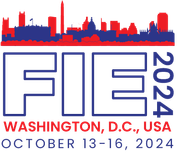Panel Guidelines
Panel sessions are intended to engage the engineering and computing education community in multiple perspectives on a given issue on the frontiers of education. These are ~80 minutes long; the number of panel sessions is limited. These sessions are intended to have a broader impact on engineering and computing education by bringing together multiple perspectives on a given topic. The sessions should be of value to FIE Conference attendees, enhance the experience and knowledge of the participants, and help advance the frontiers of engineering and computing education.
Panel Session Approval Procedure
To be approved to offer a panel session, facilitators/authors will need to 1) submit a panel session proposal (800-1000 words) via the conference submission website and 2) if the proposal is approved, submit a paper (4-6 pages) that provides sufficient detail to give attendees a sense of what to expect during the panel session to motivate them to attend.
The panel session proposal will be reviewed to determine if it is an appropriate fit for the FIE conference. If the proposal passes the first review, the facilitators/authors will be invited to submit a paper draft that conforms to the required IEEE format for the conference. This paper will undergo a more thorough, second round of peer review. Following the second round of peer review, facilitators/authors will be notified of acceptance/rejection and any final requested edits before final paper submission. Please see the conference website for a list of relevant deadlines.
Expected Content for Panel Sessions
Both the panel proposals (800-1000 words) and the panel session papers (4-6 pages) must include the elements listed below, except for the items listed under “Proposal ONLY Components”. An approximate word count for each section of the proposal is provided and can be scaled for the full paper, if accepted. The final 4-to-6-page paper will be included in the conference proceedings.
- Title: The title should start with “Panel Session:”
- Abstract: This is a brief summary of the panel session (approximately 100 words).
- Goals: The goal(s) of the panel session and the rationale for why these goals are better served by a panel session (approximately 100-200 words).
- Background: This includes but is not limited to a description of topics/subjects/content of the session and its significance in the context of the relevant literature (approximately 100 -200 words).
- Panel Description and Agenda: A description of what attendees can expect to hear, see, or experience during the panel session lasting 80 minutes, in addition to any specific details about the panel session that will give possible attendees a better understanding of what to expect during the session (approximately 200-300 words).
- Expected Outcomes: A description of the takeaway skills, knowledge, or materials that attendees will acquire because of this panel session (approximately 100 words).
- Panel Participants: The names and institutions for each proposed panel member (typically 3-5) and panel organizer/moderator (Note: members of the panel are the people who provide different perspectives on the issue being addressed by the panel. They are critical to the quality of the panel session. Some detail on panelists’ expertise is needed in evaluating proposal quality (approximately 100 words).
Proposal ONLY Components
These components will NOT be included in the 4-to-6-page Panel Session Paper if the paper is accepted for the Proceedings.
- Panel Moderator Contact Information: Name, affiliation, and email of the principal organizer of the panel session.
- Panel Questions: A list of sample questions that will be asked of the panel.
- Anticipated Audience: A description of the anticipated audience (community), and why they would be interested in the session.
- Special Requirements: Any special requirements for electricity, audio-visual equipment, or setup.
Additional Information
- All individuals involved in organizing and presenting during a panel session are expected to register for and attend the conference.
- Because panel sessions are partly evaluated based on the expertise of the facilitators, special session submissions should be prepared for single-blind review (i.e., the authors and affiliations should be identified in the submission
- Panel session proposals and papers will be peer-reviewed by at least three reviewers.
Panel Paper Format
Panel papers should adhere to the required IEEE format for the conference. Submissions should use the US Letter Template available on the IEEE conference website (https://www.ieee.org/conferences/publishing/templates.html).

